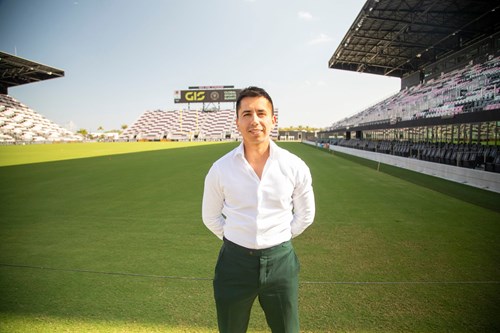Founder and CEO of Avalon Sports Deiver Montes gave an exclusive talk to UCFB and GIS students at our Miami Summit earlier this year, providing fascinating insight into the agency world and how to differentiate yourself in a notoriously difficult market.

He explained at GIS Inter Miami CF Campus how there are thousands of sports agencies out there, if not more, but they tend to have a formulaic plan that fails to cater to the specific goals and desires of the individual. Avalon’s difference, therefore, lies in their personalised plans and redistributing the power back into the hands of the athletes themselves.
Montes said: “We sit down with the player, they become part of our family. We have a conversation and we say what do you want to do in life? What are you passionate about? There has to be something more than football.
“We’re all different. We all have different stories. What might work for Jordan might not work for Levi. They’re in different stages of their career, they might have more money than others, different backgrounds.”

While the specific approach may be different, there is a unanimous understanding that in building this plan, the development of an athlete’s brand is the winning ingredient for their commercial growth and financial success.
He continued: “We believe that players must humanise the brand. We look at athletes as objects, superstars, performers; all we care about is the result. But they’re fathers, husbands, friends and members of society. That gets diluted because of the media, the pressure, and because that’s all we really care about.”
This focus upon, and shift towards, a personal brand is a growing phenomenon within sport, unleashing a world of potential in which several athletes, such as Michael Jordan and Serena Williams, transcend their sport.
The benefits of this success, however, stretch far beyond accelerating the rise to fame and adding to the ever-growing tally of zeros in the bank: it provides much-needed direction after hanging up your boots, easing the transition from professional athlete into whatever ‘second career’ they choose to pursue next.
Montes finished: “It’s absolutely key that these guys can relate to the audience – but how can you make a guy that makes so much money do that? It’s about how you’d like to be remembered outside of your career.”
Find out more about GIS' Master's degrees in football and sport.









